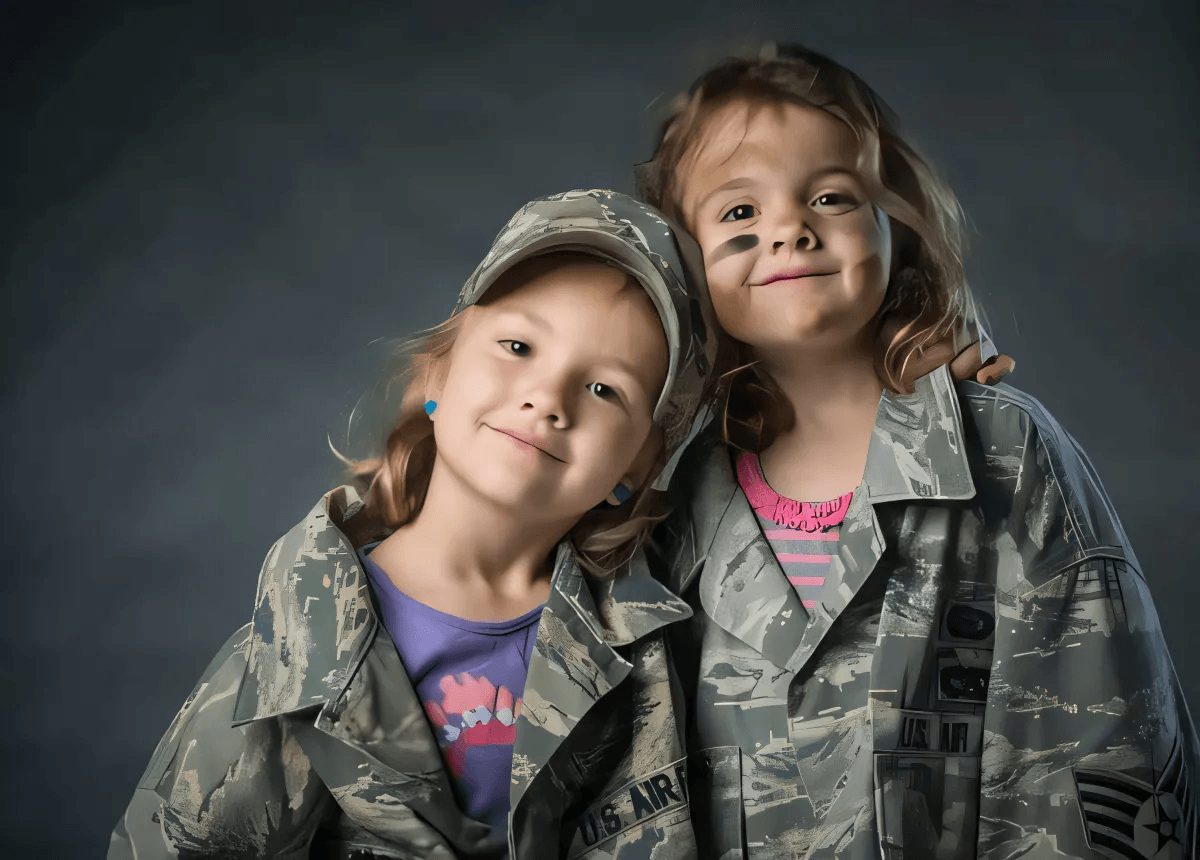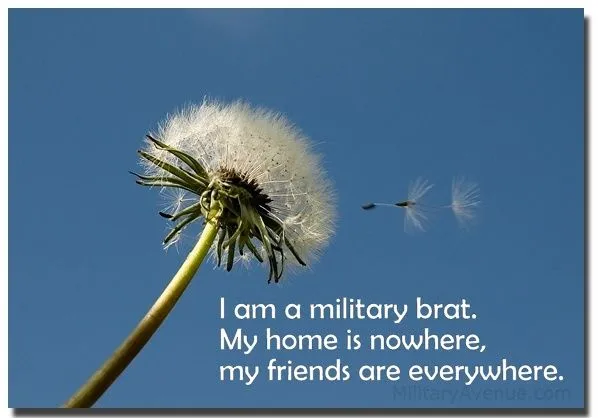The Life Of A Military Kid

Five elementary schools, two middle schools, and two high schools. Five states, two countries, and up to ten different houses. Not your typical childhood life is it? Well for a military brat like me, it's really not all that far fetched. For the majority of us, we are having to move every few months or years, if you are lucky enough. It is not easy, but we do it because our parents fight for our country and what we stand for. Our parents do something admirable, so we hold our heads high and make the best of every new home and every new situation we are in.
However, there are some obstacles that never get easier no matter how many times a family may move. In every county, and in every state the school systems are run in different ways, with different expectations of their teachers as well as their students. To be thrown into a new school, with no friends and no one to help you is very difficult. Everything from the way the school is built, to the educational level, could all be completely different from the school before.
In elementary school, your parents are not allowed to walk around with you for a week to help you get settled. In middle school and high school, there are no teachers to walk around with you to show you where your next class is going to be. On the first day of class, you have no idea what the teacher is going to expect you to know or what level she expects you to be at.
There are no set guidelines for the schools in the United States. Every school has a different view of what students should know and at what year. If your last school was more relaxed in their teaching methods, you would be left behind. If they were more strict, then you would be left to relearn everything and you would be left alone for the whole year. Each place is different. Each place has no warning and no help.
One thing that remains constant, however, is the fact that in every school, every student has a guidance counselor they can go to for their academic and personal needs. Being the new student, junior year in high school, you need help in both categories.
Halfway through high school, moving from a DODEA school in Germany to a public high school in Harnett County, North Carolina, a person needs help. Not once was I called into the guidance office to see how I was adjusting. My little sister, a new student as a freshman in this school, was never talked to and never even given a second thought. The one person that can help a student in a school, does nothing. Does not help in any way possible. Not a single conversation, not a single email, nothing.
In all of my years of being raised in a military family, not once was I pulled into a guidance counselor’s office. Not when I moved half-way through first grade from Georgia to a school in Oklahoma. Not when I moved from Oklahoma to North Carolina in third grade to a DODEA school on Fort Bragg. Then again in fourth grade, when I moved to a public school, I was on my own with no office visit. In seventh grade, I moved to Germany, amidst all military kids and I’m not the only new student this year. However, not one of us was asked how we were doing or how our transition was going. We are left to fend for ourselves, and we feel forgotten, and unimportant.
We become resilient. Almost like a chameleon, easily adaptable in nearly every situation. We blend well into our environment, you barely know we’re there. Everyone barely knows we’re there. We pack up our lives, at a moment's notice, and start the process all over again. We leave our friends, we leave our new lives, and they now join our old ones. Our lives are tossed around and lost in the masses. We lose our friends everywhere we go, and we lose ourselves, little by little. In order to survive, we must adapt, and we must learn the social ways of our new home, as well as the academics of our new school.

Opinions and Perspectives
The resilience we developed is amazing, but I wish it hadn't come at such a high emotional cost.
This article really captures the unique challenges we faced. I hope it helps others understand our experience better.
Despite all the challenges, I wouldn't change my experience. It shaped who I am in ways I'm grateful for.
The lack of continuity in education is a serious issue that needs addressing. It affects so many military families.
My experience taught me that home isn't a place, it's the people you're with. That's something I still carry with me.
The chameleon comparison is perfect. We learned to adapt quickly just to survive.
I appreciate how the article captures both the challenges and the resilience we developed.
This brought back so many memories. I hadn't thought about those first-day-of-school feelings in years.
Looking back, I realize how much strength it took to start over repeatedly. We were tougher than we knew.
The part about losing friends really hits hard. Social media helps now, but back then it was like starting from scratch every time.
We definitely need more standardized education across states. The current system really hurts military kids.
It's interesting how we all developed different coping mechanisms. Some of us became super outgoing, others more reserved.
The article doesn't mention the unique perspective we gain from living in different places. That's actually a huge advantage.
I'm thankful for the experience now, but I wish there had been more support systems in place when I was going through it.
Military kids are some of the most resilient people I know. We learned to handle change like champions.
The description of feeling forgotten and unimportant really struck me. That's exactly how it felt sometimes.
I think schools need to implement better buddy systems for new military kids. Having a peer guide would help so much.
Anyone else become really good at reading social cues? I had to learn quickly how to fit in at each new school.
The constant moving taught me to live minimally. It's hard to accumulate stuff when you move every couple years.
I'm proud of my military kid background. It made me more independent and adaptable than most of my peers.
The article nails it about having to figure everything out on your own. No one ever showed me around or helped me adjust.
I learned to keep my relationships surface-level because I knew I'd be leaving soon anyway. That's had lasting effects.
There should be mandatory training for school staff on how to support military children. The current system isn't working.
What helped me most was connecting with other military kids who understood what I was going through.
The emotional toll of constantly starting over is something I'm still dealing with as an adult.
I became an expert at being the new kid. First day of school? No problem, I've done this ten times before.
True, but let's not forget how hard it was to maintain any sense of consistency in our lives.
Living overseas was the best part of my military kid experience. Those memories are priceless.
The skills we learned as military kids are invaluable. I can adapt to any situation now without breaking a sweat.
I wish more teachers understood what military kids go through. A little extra attention could make such a difference.
My parents tried their best to make each move an adventure, but it was still really hard sometimes.
The article perfectly captures how isolating it can feel, especially in those first few weeks at a new school.
I actually had the opposite experience with making friends. Being forced to adapt made me more outgoing and better at connecting with people quickly.
The part about losing ourselves little by little really resonates with me. It took years to figure out who I really was.
Anyone else feel like they developed commitment issues from moving so much? I still struggle with putting down roots anywhere.
Sometimes I feel like people don't understand how much we sacrificed as military kids. It wasn't just our parents serving, it was the whole family.
The lack of standardized education across states is a huge problem. I was learning the same things multiple times in some subjects and missing crucial parts in others.
I find it interesting how different DODEA schools are from regular public schools. That transition was particularly challenging for me.
The resilience part is so true. I'm grateful for that skill now as an adult. It's helped me in my career tremendously.
Something not mentioned is how this lifestyle affects college applications. It's hard to maintain consistent extracurriculars when you're always moving.
I think the article understates how challenging it is to move during high school. Those years were particularly rough for me.
My kids are going through this now as military brats. It breaks my heart to see them struggle, but they're becoming such strong individuals.
Looking back, I wish schools had better support systems in place for military children. We really needed more help with transitions.
The academic inconsistency between schools was my biggest struggle. I was always either ahead or behind.
I actually loved moving around! It gave me a chance to experience different cultures and meet new people. Not everything about being a military kid is negative.
The hardest part for me was always saying goodbye to friends. You never really get used to that feeling.
I respectfully disagree about the completely negative take on guidance counselors. My experience was different. I had some really supportive ones who helped me adjust.
The comparison to a chameleon is so accurate. We learned to blend in quickly because we had no other choice.
While I understand the challenges, I think being a military kid also brings unique advantages. We learn adaptability and resilience from an early age.
I can relate to everything mentioned here. The part about guidance counselors really struck a chord with me. I never got help adjusting either.
This article really hits home. Growing up as a military kid was exactly like this. The constant moving and readjusting was tough but made me who I am today.